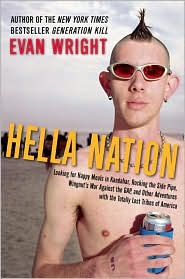
I'm fairly prone to nightmares. Sometimes the things I see or read contribute to those; sometimes they don't. After reading several essays from Evan Wright's Hella Nation: Looking for Happy Meals in Kandahar, Rocking the Side Pipe, Wingnut's WarAgainst the GAP, and Other Adventures with the Totally Lost Tribes of America, my nightmares were definitely the result of what I had learned about.
It's not that I'm completely naive when it comes to the ways of the world. I've written research papers on female serial killers. I used to subscribe to Marie Claire, a magazine whose world coverage of the female condition is unmatched by other women's magazines. I've read mystery and thriller novels that detail the most heinous crimes imaginable. But for some reason, the people who are the subject of Wright's writing got to me.
Wright is a "Gonzo journalist," who immerses himself in the stories he is writing. Although in the introduction to Hella Nation he argues against this label, stating that he doesn't focus on himself, I have to agree with those who consider him such. According to the Wikipedia article about Gonzo journalism, it is:
a style of journalism which is written subjectively, often including the reporter as part of the story via a first person narrative. . . . The word Gonzo was first used in 1970 to describe an article by Hunter S. Thompson, who later popularized the style . . . . Gonzo journalism tends to favor style over accuracy and often uses personal experiences and emotions to provide context for the topic or event being covered. It disregards the 'polished' edited product favored by newspaper media and strives for the gritty factor.Using this as a definition, Wright meets on all fronts. He involves himself in the subject matter, using first-person point of view to describe the scenes and people. He also uses his own experiences to write supposed non-fiction pieces that some would argue are orchestrated by him. And they're definitely gritty.
In this collection of essays, all of which have appeared previously in publications from Rolling Stone to Vanity Fair to LA Weekly, Wright pens stories about everything from the dotcom boom to 1930s style dance halls still in existence to a fatal dog attack to a group of Aryan Nation followers led by a self-proclaimed Christian preacher. The collection is meant to tell the story of those living below the radar, far from the norm of everyday society. Wright definitely accomplishes this, but what else he accomplishes is unknown. For me, obviously, it was frightening.
Wright is also the author of Generation Kill, a book based on his experiences as a reporter embedded with American troops during the beginning of the Iraqi War. It was later made into an HBO miniseries.

No comments:
Post a Comment